Mining the Miracle

Sports Illustrated’s annual “Where Are They Now?” issue catches up with the stars and prominent figures from yesteryear—past features have included Sammy Sosa, Brett Favre, Dennis Rodman, Tony Hawk and Don King. The 2019 issue features an inside look into the new life of Alex Rodriguez, Yao Ming’s mission for Chinese basketball and more.
For more great storytelling and in-depth analysis, subscribe to the magazine—and get up to 94% off the cover price. Click here for more.

The Siam Paragon shopping mall calls itself The Pride of Bangkok, and it's easy to see why. Once shoppers walk under the hanging gardens and over the artificial lagoon in the food court, they can visit showrooms full of Italian cars and one of the largest aquariums in Southeast Asia. And, on one day last September, if they had walked past the Cold Stone Creamery and muscled through a scrum of international paparazzi, they could also have seen a live-action exhibit featuring the real-life Boys in the Cave.
The exhibit, Tham Luang Incredible Mission: The Global Agenda, celebrated what the global press had called the feel-good story of the year—the 18-day, 10,000-person mission to rescue 12 Wild Boars youth soccer players and their assistant coach, Ekapol Chantawong, from a flooded cave near the Thailand-Myanmar border.
Seventy-seven days before the team assembled at the Siam Paragon, they had biked after a practice up to Tham Luang Nang Non, the Great Cave of the Sleeping Lady. While they explored, the usual July rains came ahead of schedule. Millions of gallons of water rushed through the porous limestone, and the Boars had to flee to an elevated rock 2½ miles from the mouth of the cave. It took nine days to find them there, and it required elite cave divers, industrial-grade water pumps, several nations' militaries and miraculous fortune to get them out.
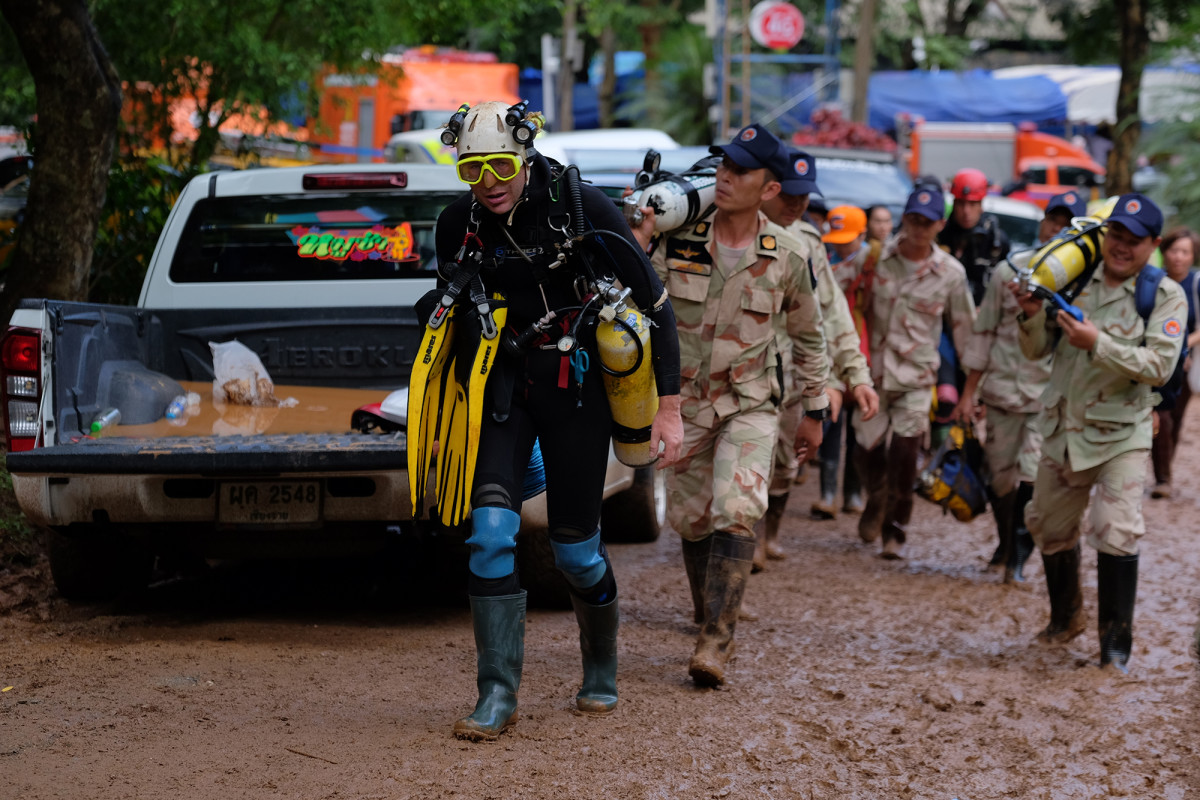
In the heart of the mall exhibit, surrounded by diving gear and thermal blankets that had been used in the rescue, was a 33-foot-long plastic replica of that cave. And on Sept. 8 the Wild Boars were asked to line up and crawl through it.
The Boars and Coach Ek were led single-file into the mouth of the fake cave, protected from the horde's cameras by two walls of men in purple ties. The boys wore yellow, the official color of the Thai royal family, and their scrawny frames ducked to clear the three-foot ceiling. They crawled underneath Styrofoam stalactites, and less than a minute later, they reached the other end. Stepping out, they looked back up at the journalists, mall employees, government officials and everyone else who would keep mining that cave until there was almost nothing left.
What happened after the rescue at Tham Luang? For all the attention devoted to the boys' fates while they were in the cave, less has been made of what has happened to them since. They faced likely death; 10,000 strangers congregated to save them; they lived; the world's news cycle spun on to the next thing.
As I would learn once I visited Thailand, what came after the miracle was an earthbound, all-too-human cottage industry. In the year after the rescue, international media conglomerates jockeyed for the rights to the boys' story, government officials steered the boys' public relations, and the Wild Boars' soccer team mostly fell apart.
Maybe it was always headed that way. Even when the boys and their assistant coach were still trapped in the real cave, before anyone knew if they'd come out global celebrities or not come out at all, the Tourism Authority of Thailand had announced plans to turn Tham Luang into a major travel destination. Once the Boars were helicoptered to Chiang Rai to recover from their injuries, one foreign news agency reportedly offered their hospital a large donation in exchange for access to them. When the 12 boys and Coach Ek were released one week later, an American network hired 12 vans, one to wait at each boy's home.
Initially, Thai officials followed recommendations from psychiatric specialists: After one team interview with a Thai broadcaster, they announced a six-month moratorium on media access, enforced by a governmental task force called the Creative Media Committee.
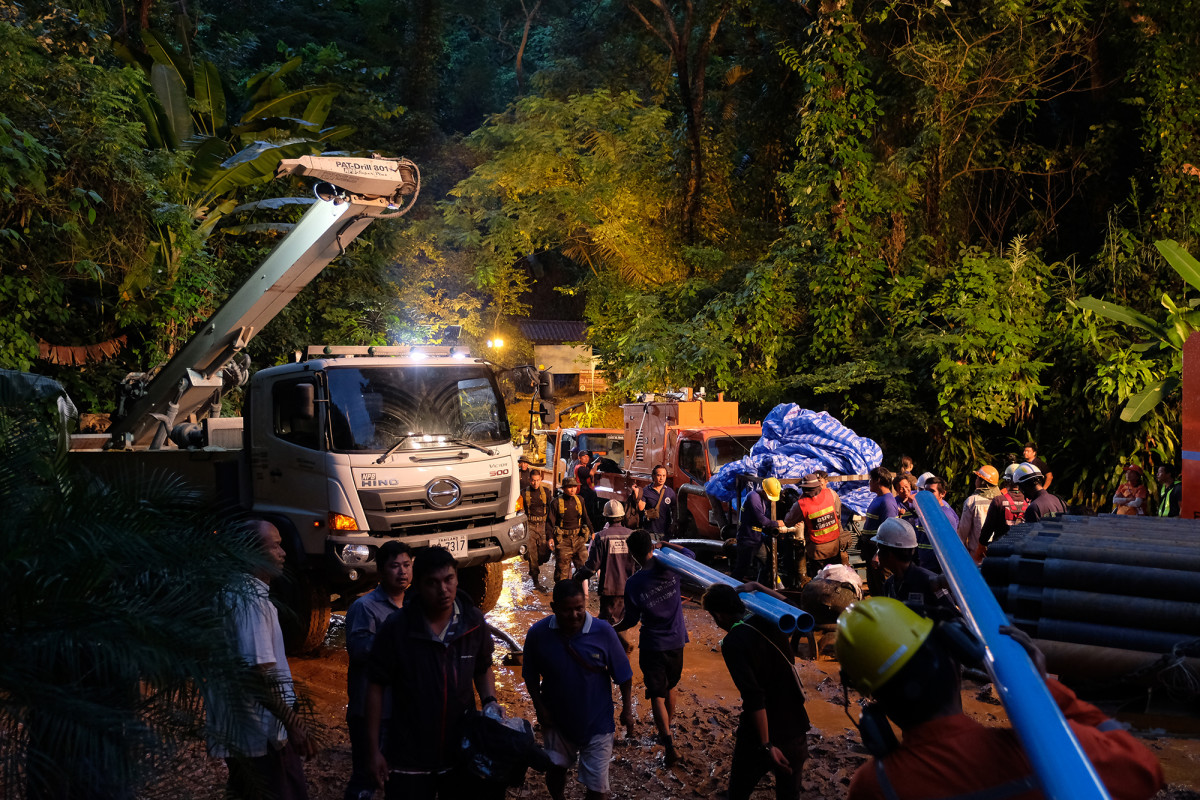
Protected from the swarming press, the boys returned home to Mae Sai. At Wat Phra That Doi Wao (the Scorpion Temple), the Boars participated in mountaintop Buddhist ceremonies and the practice of merit-making for Saman Gunan, the former Thai Navy SEAL who had drowned while installing oxygen tanks along the rescue route. They also returned to practice with Nopparat Khanthavong, the Wild Boars head coach who had injured his neck fighting volunteers restraining him from sprinting into the cave during the rescue.
While the boys rested, though, the Thai government faced a public-relations crossroads. The miracle at Tham Luang came at a favorable moment for the ruling military junta, which, after taking power in a 2014 coup d'état, had called for a long-delayed election to take place in early '19. The successful rescue operation, wrote political scientist Pavin Chachavalpongpun in The New York Times last summer, brought the nation closer to the Western governments that had criticized it for its record on freedom and human rights. With the right p.r. approach, the rescue's afterglow could put a "softer face" on military rule.
So, less than two months after the rescue, the committee broke its own press embargo. On Aug. 23, ABC News aired an interview with the Boars, noting that 800 media organizations had competed for the opportunity to do so. From there, the Thai military junta became progressively less selective. In early September, government leaders flew the boys and Coach Ek to Bangkok. In addition to the cave replica at the Siam Paragon mall, the boys attended a 10,000-person United As One rescue banquet thrown by the prime minister.
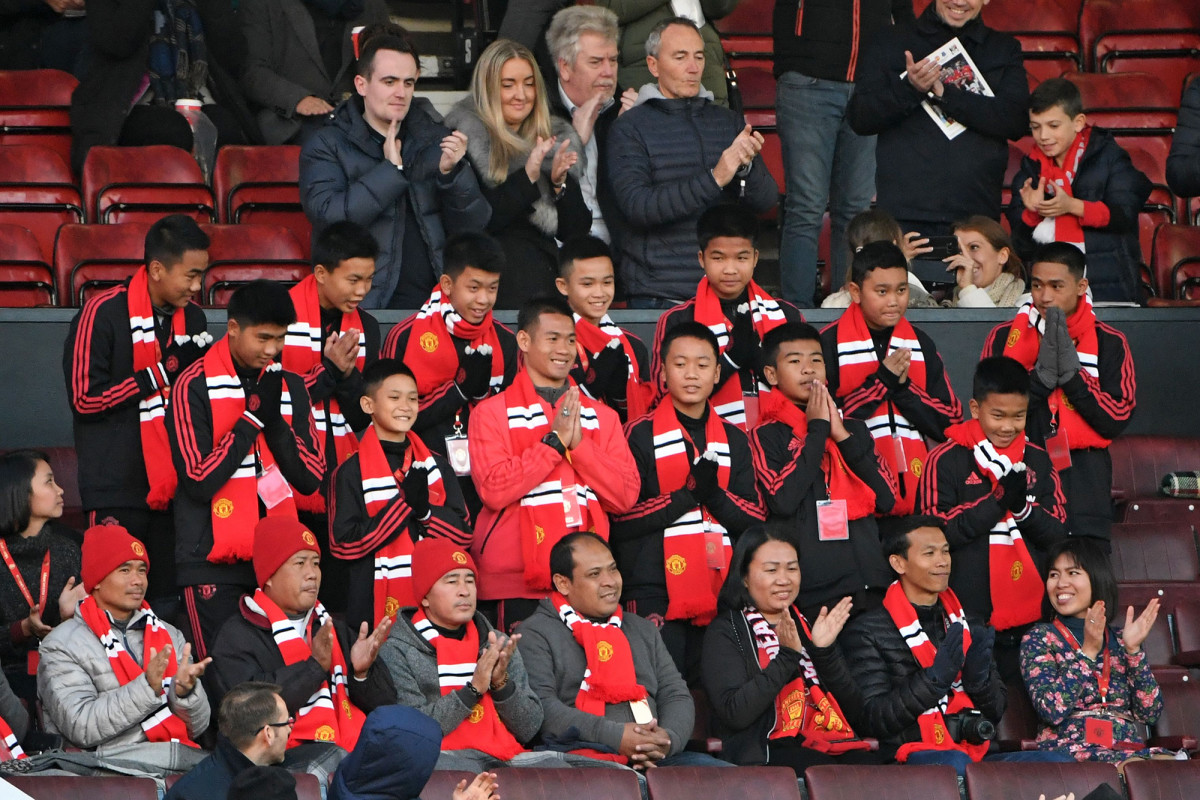
Afterward, the Creative Media Committee sent the team abroad on a thank-you tour. The boys' Instagrams showed them together at the Youth Olympic Games in Argentina, with Manchester United stars at Old Trafford, next to Zlatan Ibrahimovic on Ellen and at a youth friendly match in Fukushima Prefecture, better known for its own disaster—an earthquake, tsunami and nuclear meltdown in 2011. One of the country's most visible leaders, deputy government spokes-person Lieutenant General Werachon Sukondhapatipak, accompanied the boys on most legs of the trip.
As the team and the general returned from those trips, another carousel of the media circus continued to spin. In the first two weeks after the rescue, five international production companies had announced plans to buy the Wild Boars' life rights. When the government held an open call for scripted cave-rescue film proposals in November, that number ballooned. Hollywood powers were thirsty for the boys' story, and to get it they'd have to go to unusual lengths.
On April 30, three days before my arrival in Bangkok, the 12 Wild Boars and Coach Ek attended a press conference hosted by Netflix, SK Global Entertainment and the Thai government. Once again they wore yellow shirts, this time under blazers. Netflix and SK Global had recently secured their life rights, and they had come to Bangkok to launch a miniseries about the rescue. Said Erika North, director of International Originals at Netflix, "Thailand is a very important country for Netflix, and we are looking forward to bringing this inspiring local but globally resonant story of overcoming seemingly insurmountable odds to life, once again, for global audiences."
The press conference marked the end to a frenzied content war. Last September, Universal Pictures announced that it had acquired the life rights for the Wild Boars, Coach Ek, and two key Australian divers. An agent from CAA had flown to Chiang Rai and Australia to negotiate the deals, and producers from Captain Phillips and Fifty Shades of Grey had signed on for a scripted feature. After the announcement, however, Thai leaders declared that any foreign life-rights deal would have to go through them. (According to a source close to the negotiations, the Thai government had a list of requirements, including script approval.) And in March, officials announced a different winner.
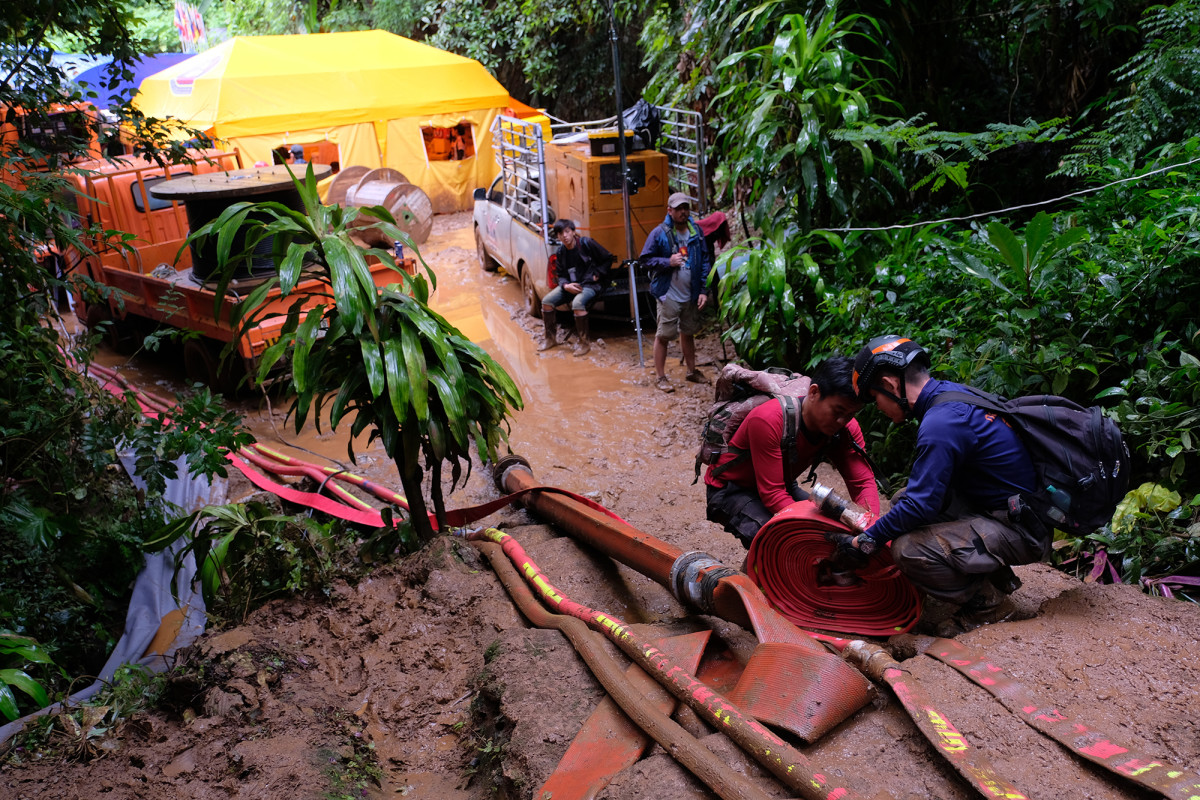
Netflix and SK Global Entertainment, cofounded by a billionaire mining executive, now owned the rights to the Wild Boars' story. Jon M. Chu, who had directed SK Global's first global hit, Crazy Rich Asians, was announced as the project's co-director, alongside Thai filmmaker Nattawut (Baz) Poonpiriya, one of the country's best-known young talents. While Universal had planned to work alone, Netflix and SK Global agreed to coproduce their miniseries with the Thai government.
Near the center of these proceedings had been General Werachon. His personal Instagram includes more than 50 selfies with the Wild Boars, and he'd helped advise on the team's film and press considerations. After I arrived in Bangkok, I met him at the Government House. I sat in a fluorescent-lit room on one end of a very large wooden table, and the general sat opposite me. Next to him were three other government spokespeople. Two of them wore yellow ties.
He described the reasoning behind founding the Creative Media Committee: "People realize that there's a vast potential for commercial benefit," he said. "Therefore we should protect [the boys], and if a kind of commercial deal would be happening, they must be treated fairly. So we look after them. We must ensure that they can live their normal lives in society. We want to help them survive in this cruel world, particularly when they're accosted by the media."
He walked me through the formation of the 13 Tham Luang Company, a private venture consisting of Coach Ek and several Wild Boars parents. The company had permission to make life-rights decisions on the behalf of the boys, and after input from General Werachon and several national luminaries, they ultimately picked Netflix and SK Global.
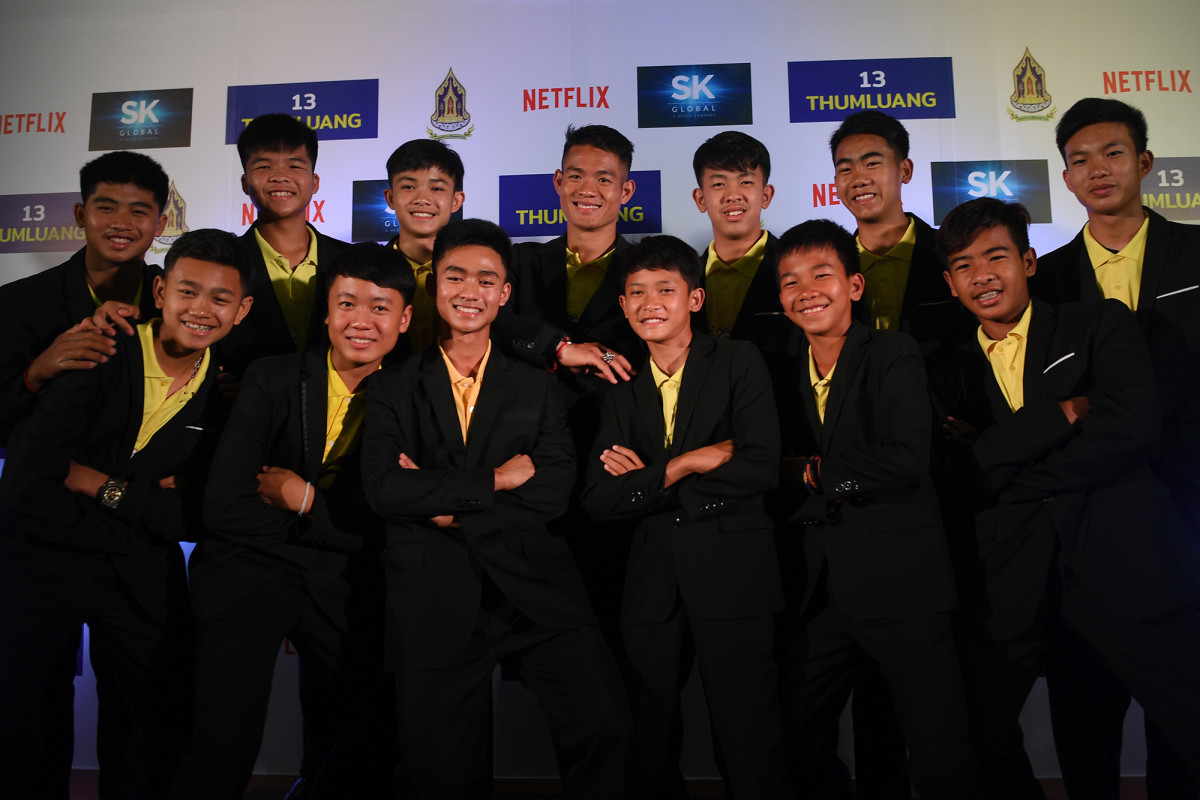
I asked the general about the finances of the deal. All told, the boys were promised 3 million baht (roughly $94,000) each. (According to The Wall Street Journal, the Universal deal would have paid the participants $115,000 each.) He said that the families had all made a "gentleman's agreement" to share some portion of that sum with a Thai natural disaster fund.
I asked the general if the Thai government had been paid as part of the life-rights deal.
"I'm wondering, why is SPORTS ILLUSTRATED so interested in this money issue?" he said. "... Frankly speaking, to be honest, I'm just wondering why, coming from SPORTS ILLUSTRATED, you focus only on the issue of the movie-making deal. I'm just curious."
For one of the first times that afternoon, the three other government spokespeople began talking. "Will you also be covering stories about football?" one said. "The impact of [the boys'] stories on the sports scene in the province or the country in general?"
"They survived because they are a team," said another. "They survived because they worked as a team. And now they're doing well because they remained as a team."
"I didn't expect that it would be a movie-deal story," the general said.
The fourth spokesperson said that movie-rights questions could only be answered by the 13 Tham Luang Company. But when I had called the 13 Tham Luang Company, they had told me, naturally, to reach out to General Werachon.
However wealthy the media circus had made the boys (and whomever else), it also represented a new source of risk in their lives. Dr. Rebecca Sheriff, an Oxford-trained childhood trauma expert, had worked as a psychiatric consultant to Thai officials in the days immediately after the rescue, and I asked her about the last few months. "God, we're not letting them [recover]," she said. "It was obvious before they were even out of the cave that it was going to be very difficult for them to use their normal coping strategies, in which case they would have been fine. And now it's like, O.K., well, what is going to happen?"
Up at the hospital in Chiang Rai, Sheriff had given the medical team the following advice: Allow the boys to reenter their existing support networks; monitor them unobtrusively; keep them away from the media.
"My perspective was, They'll probably be all right. Just leave them to themselves, and ... if one of them does start to show signs, these are the things we need to do. And actually, I said the main danger here, from the point that they got out of the cave, was the media. Which is tragic, right? But everyone wants to jump on it; it's a weird psychological thing. All the embassies, everybody. Everyone loves it. [I want to tell them]: You're damaging these children. What are you doing?"
On the drive from the Chiang Rai airport to a soccer field in Mae Sai, I looked up toward the blue sky and through what looked like white mist. In fact it was a smoky blend of crop fires, trash fires and forest fires. Than Rassadanukul, my local fixer, pointed through the window of our Toyota Yaris toward a mall. "I bring American journalists to Chiang Rai and they're expecting the jungle, and then they're like, 'Hey, a Dairy Queen!'"
As we got closer to the soccer field, Than described how the Wild Boars story had made him something of a media mogul. Last year, when he was 28, he set up interviews, translated for reporters and coordinated a small army of other fixers for ABC. He'd also worked with ESPN and corresponded with Tesla (before Elon Musk called one of the rescuers a "pedo guy" on Twitter). Recently he'd turned down a foreign network that wanted to covertly film the boys while dressing like tourists.
The drive got more rural, and soon we could see hyper-green mountains ahead of us. After turning left and driving up a few switchbacks, we arrived at a Wild Boars practice. The practices take place most weekdays after school, and a few of the players' classmates loitered on the sideline. The familiar sound of cleats on grass moved through the humid air, and, as is often the case these days, none of the cave rescuees were there.
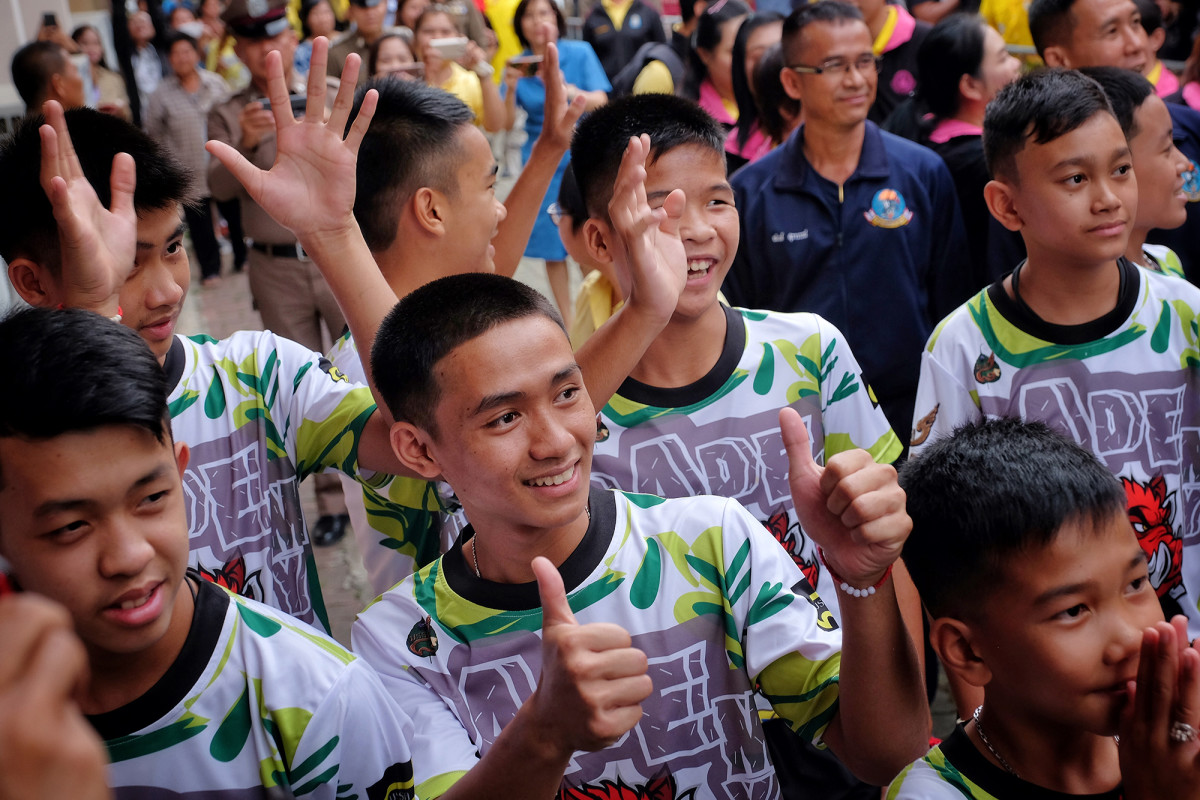
Coach Nopparat sat in a plastic chair and surveyed the field. His neck was still injured from straining against volunteers who'd held him back from the cave, and he had to twist his whole torso to face us. Coach Nop is a skinny man with a skinny mustache, but even while smiling he looked like a coach you wouldn't want to disappoint.
After making plans to meet Coach Nop for dinner, we left the field and continued up the mountain, tracing the same route toward the cave that the kids had biked a year before. The road wound left and right and turned to dirt, and before long we were surrounded by dozens of vendors. We saw women selling T-shirts with the boys' faces on them, a man in a cowboy hat making his own red soda and a grandmother selling a framed photo of Elon Musk.
The cave's mouth was fenced off, as it has been since the rescue, but we drove on and saw dozens more souvenir booths. Covering a former pineapple field and acres of previously empty dirt, there were more than a hundred stalls in all. After stopping by a new cafe with a plasma TV and an espresso machine, we talked to the vendors outside. We kept hearing the same undeniable math: The pay here was often steadier and better than harvesting pineapples, rice or coffee. On New Year's Day, 30,000 tourists visited the stalls. Before the movie deal closed, one Wild Boar mom even had a T-shirt booth.
On our way down the mountain, we met a former park ranger who now gives tours. We asked what he thought of the upcoming Netflix series, and he smiled: "There will be more publicity, more booming, more traffic, more business."
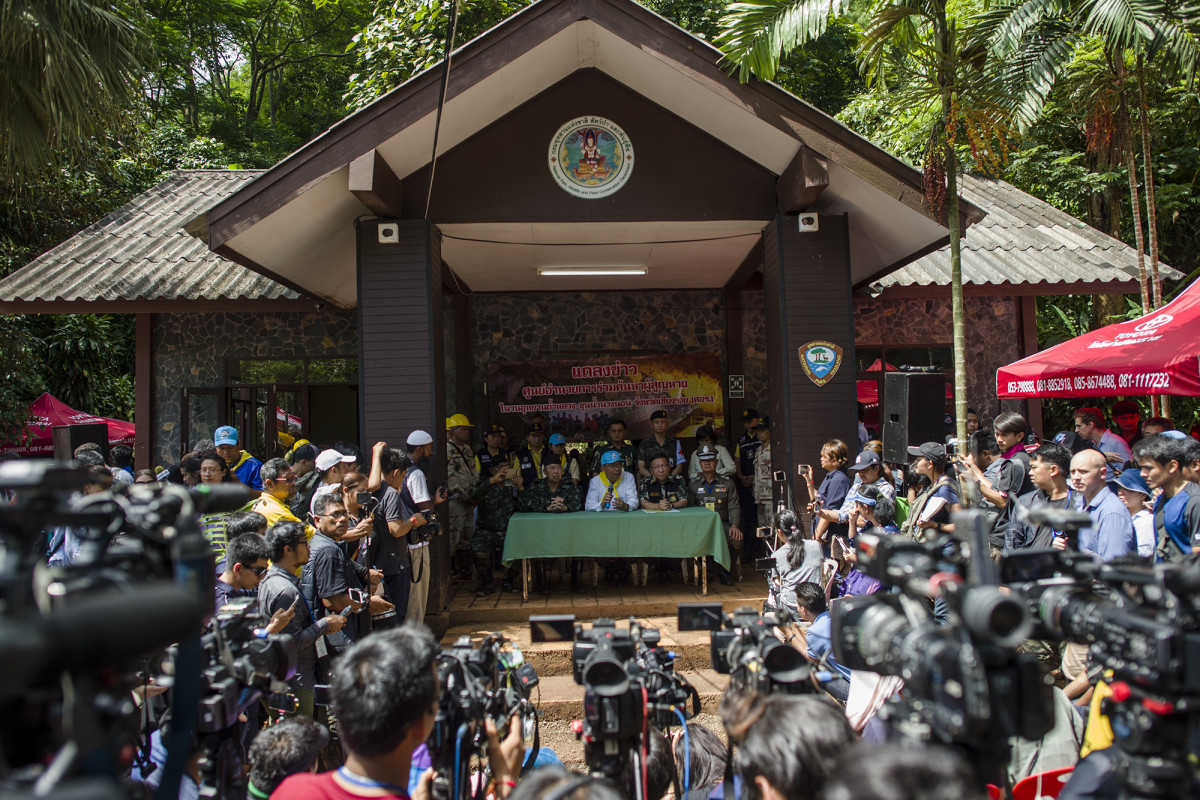
We spent the next few days below the mountain, talking to the Wild Boars' friends, teachers and faith leaders around Mae Sai. Many of them had media horror stories—journalists interrupting classes while students still thought the boys might be dead, film crews shouting at the families right as the boys were found alive—but they nearly always laughed while telling them.
Nestled in a tip of the Golden Triangle, on the border with Myanmar, Mae Sai is a trading hub and great place to buy duty-free tchotchkes. In the past it has been a boomtown for a few industries. First it was the opium trade, then it was coffee and methamphetamines, and now it's the cave.
On a residential street not far from Tham Luang, we visited with Mae Bua, a 57-year-old rice farmer from Mae Sai. Last year she'd allowed the rescuers to pump cave water into her rice paddies—damaging the year's crop—and she'd refused the government's reparation payments. As she handed us glasses of water under a smiling Bob Marley poster on her covered front porch, she said we were probably the 20th or 30th journalists to come ask her about it. She mentioned that one group had showed up with a 10-person crew, and after a long interview, they'd paid her $800 for her life rights.
A few nights later, we met Coach Nop at Rong Tiam 168, his favorite restaurant. He took off his neck brace and set it down next to his Liverpool F.C. shoul-der tote. He'd just finished practice, which he schedules after his day job as assistant chief of his village, Ko Sai.
After years of organizing informal games, Nopparat founded his own team in 2016, when he was 36. He called the club Moo Pa (which translates to Wild Boars, or Forest Pigs) because the team was sponsored by a pork exporter. They were the only football program in town that didn't charge tuition, and kids would often walk by the field and ask to join. Sometimes, Ekapol Chantawong, a former monk who worked in a nearby market, would keep shop until 6:30 p.m. and then bike to the practice. Both his parents had died by the time he was nine, and like several of the Wild Boar players he coached, he grew up stateless, belonging to the Tai Lue minority, a tribe whose members have moved around the Golden Triangle but are seldom granted citizenship anywhere. (After the rescue, Ek and the stateless Boars were granted Thai citizenship.) After one practice, when Coach Nop asked Ekapol about his mother and father, Nop realized that Ekapol's father had been Nop's high school soccer teammate. By the time Coach Ek officially joined the Boars, Nop said, the two coaches were like "brothers."
Before we ordered our food, Coach Nop took out his phone and opened Line chat, a popular messaging app in Asia. He wanted to show us his conversations with a man from SK Global.
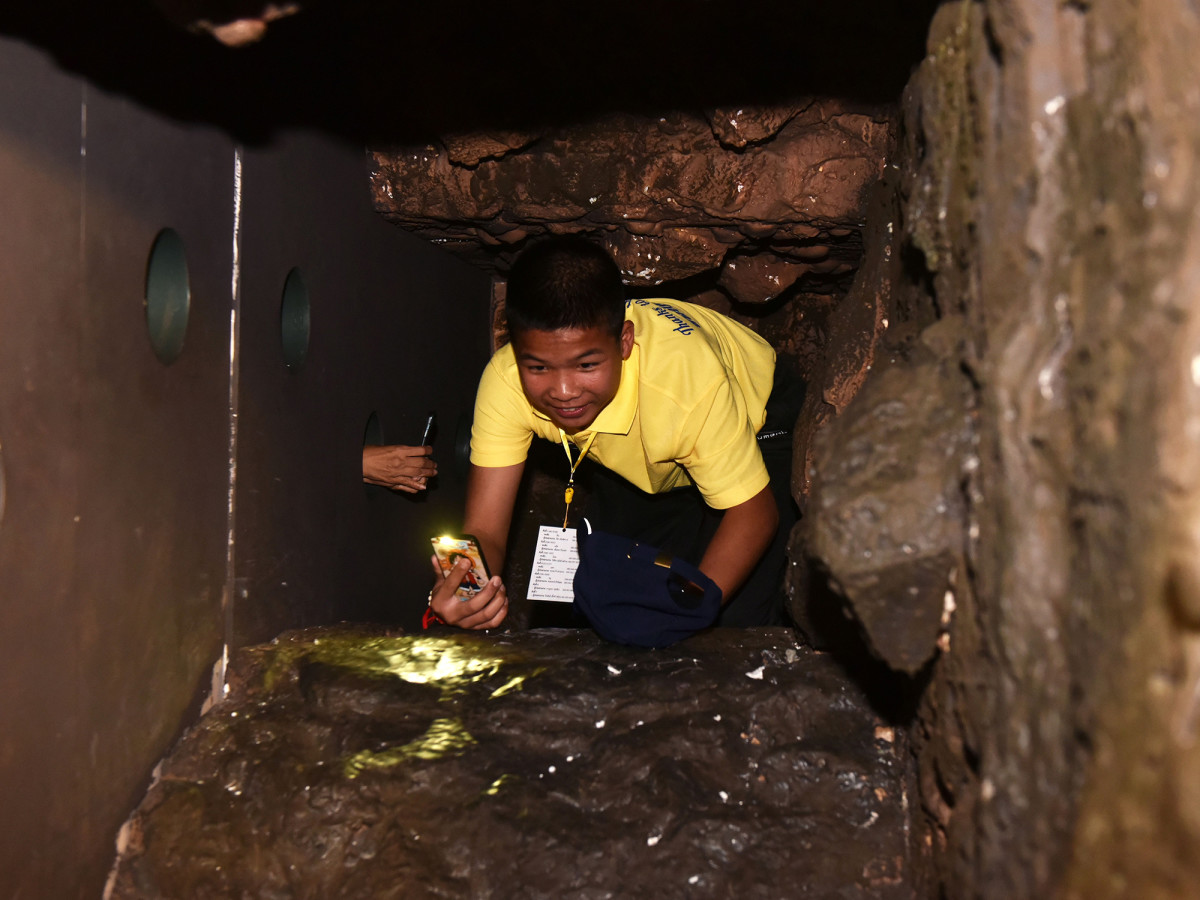
The Tham Luang replica that the boys crawled through is now part of a mall exhibit.
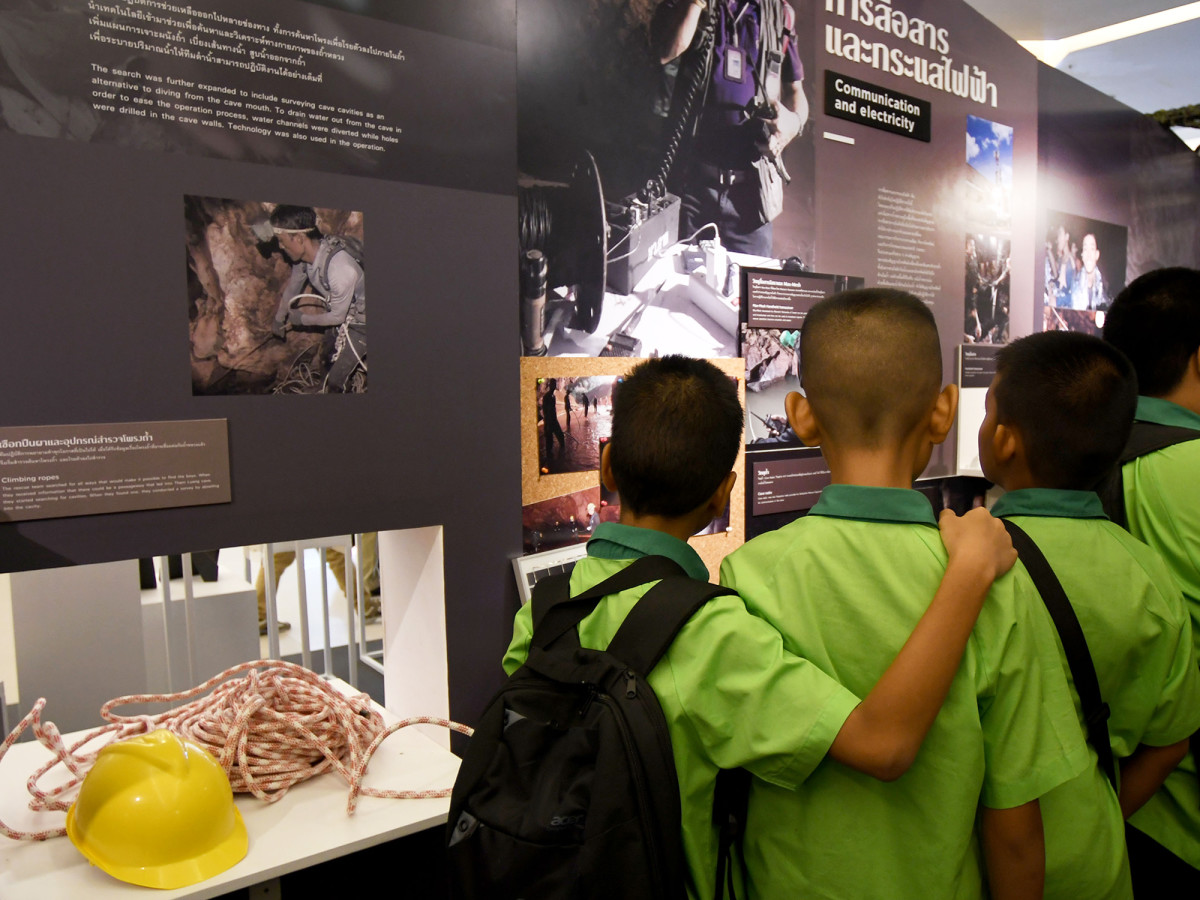
One month after the rescue, the man, an executive, began staying in Mae Sai and visiting Wild Boar practices. According to Coach Nop, the man leaned on Nop to convince Coach Ek to talk to SK Global. Coach Nop turned his phone around and showed us months of texts from the man in what Than called "Karaoke Thai." (The words are spelled phonetically, using the English alphabet.) In the thread are at least 10 voice calls, some of which are more than an hour long. There are also several links about Crazy Rich Asians, and the pleading puppy-dog-eyed emoji.
What ultimately won Coach Nop over was something more practical. "I had a ban on my under-13 players riding motorbikes to practices.... If the kids weren't riding bicycles, I'd sent Coach Ek to pick them up. It'd be a group of five on his motorbike," Nop told us. "[The SK Global man] said, 'that's too dangerous! Just go pick two vans, I'll make it happen.' He told us to set up a company, to get incorporated, so we can get the cars. So I did all of that."
"He told me that he'd involve me in the production," Nop said. "He said, 'If things are happening, we'll keep you in the loop.'"After several in-person conversations, Coach Nop finally introduced the executive to Coach Ek. He told us that they met at the Mekong Delta Hotel, and the man gave Ek his card. Later, Coach Nop said he got a Line chat from the man explaining that he couldn't purchase vans for the team after all. Months later, in May, Coach Nop got a call from Coach Ek: "'Hey I'm in Bangkok. Do you want anything?' And I asked, 'Why are you in Bangkok? To sign the life rights?' And Coach Ek said, 'Yeah! Nobody reached out to you?'"
(In a response, SK Global co-CEO John Penotti said: "As we learned more about these boys, it would have been our pleasure to help out in any way possible. Unfortunately, however, we were advised that we were not legally allowed to make any kind of material donation. Several months later, we were fortunate to meet Coach Ek and the boys in person and were honored when they chose us as the stewards of their brave and inspiring story.")
The Wild Boars played the final game of their season on May 11, on a grass field in Mae Sai ringed by a dirt track. Kids in the stands played with blocks. A few dozen parents screamed when the boys had scoring chances. Coach Nop sat under a tent next to the Wild Boars who weren't playing. Aside from the 104° heat and the presence of two reporters, it was like any other under-15s soccer game.
Running through the grass in cleats donated by their fan clubs, two of the Boars from the cave chased the ball. Many of the Tham Luang survivors had already left the team, and starting next year they'll all be elsewhere. Several will leave for boarding-school scholarships in Chiang Mai and Bangkok, but Duangphet Phromthep and Adun Samon came for this last game. They sprinted under trees drooping with heat, spacing the field and trying to lead an aggressive counterattack.
Wearing rubber sandals, Coach Ek cheered on his former team from the stands. He'd resigned from the Boars earlier in the spring to start his own team, with a lengthy but vague explanation. In a Facebook post, after thanking the Boars, he'd written: "Lately I don't have time to go help with the team, and I don't have any contributions, and I'd only damage the team's reputation. I may have acted without permission and there might be damage done to the team, so today I will take responsibility for what I've done by resigning from the Wild Boars team. I beg that everybody understand me; at this point, it's time that I walk the path of my dreams, the path that I've chosen for myself." When Than asked him about it, Coach Ek said that he'd remained close to Coach Nop and the players; he just wanted to start his own program. He said he hoped for his new team, Ekkapol Academy, to collaborate with his old one.
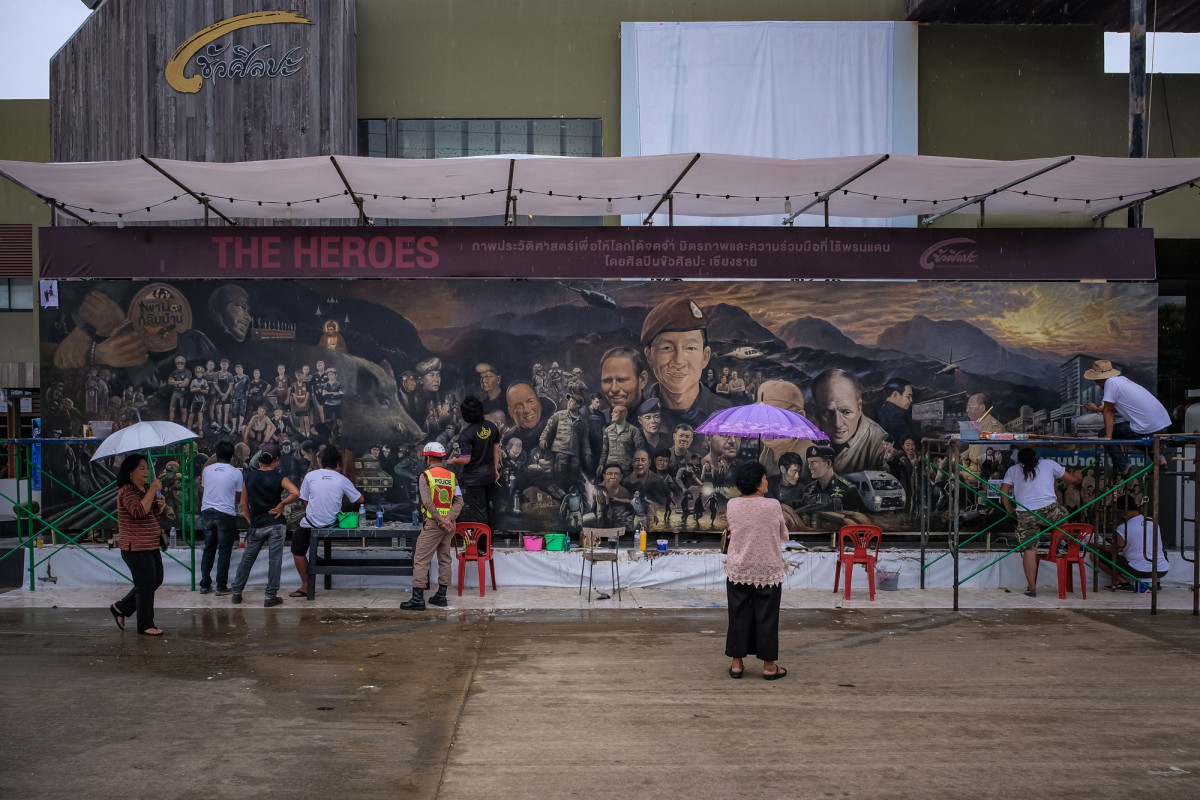
At the cave site, a huge artists' mural honors the team and rescue heroes.
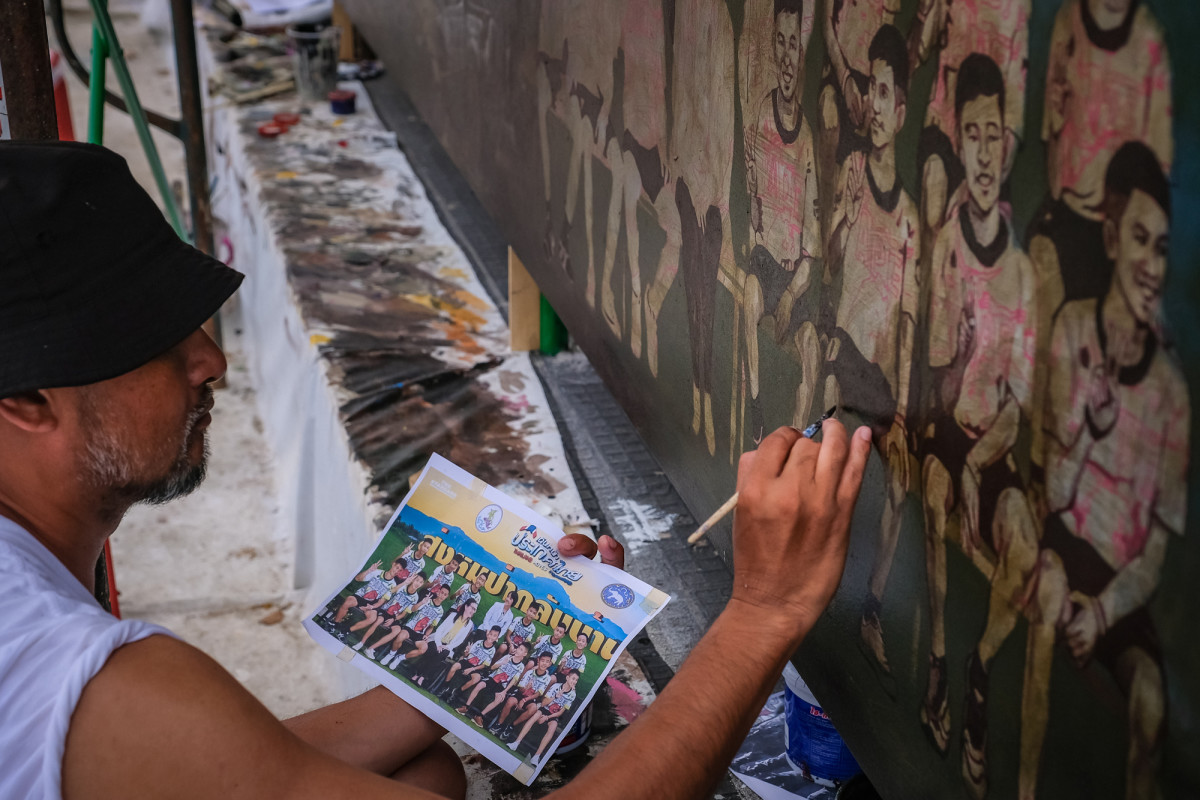
The Wild Boars lost 4--1 that day, and they ended the season with two wins, 12 losses, and four ties. After bowing to the opposing fans and hydrating under the tent, the team sat on the grass for an announcement by Coach Nop. Wearing red pants, aviator shades and the Boars' rainbow jersey, Coach Nop wheeled out a big light-up karaoke machine. Facing his players, he talked into the microphone.
"We lost because we weren't as good as them. But we won matches because we came together," he said. "We fought them with our sweat."
Pivoting his torso, he continued: "I, Coach Nop, will be ending my role as the coach of the Wild Boars Academy team.... From now on I will have no role and no involvement whatsoever with the Wild Boars Academy. One thing I will be taking care of is my health, the past three, four months ... well, I know everybody is as tired as I am. Every time I yell at you, it wasn't because of hatred or any personal emotions, but every time I did it, it was because of love.... Today I wish you all the best of luck in your future endeavors. I hope your wishes will come true."
Coach Nop sniffled behind his aviators. The boys fidgeted on the ground and pulled at the grass, and their parents tried to smile. The team stopped filming its Facebook Live stream, and the speech was over. While the incoming head coach cleaned up the tent, Coach Nop talked to Than. "When the team became more famous, there were people who approached the team," Nop said. "Some really came to help, and some came to get certain things.... Those people who thought they should get something from being involved with a youth football team, they don't align with my way."
The day before the final Wild Boars game, I'd gone to visit the cave rescue exhibit. It'd been moved from the Bangkok mall to the Scorpion Temple, and I got there before evening prayers. Outside were statues of the boys, and inside were hundreds of photos. On the ground floor, I stopped at a tribute to Saman Gunan. There were images of his funeral and pictures of his statue by the cave, but there were also photos of his life before the rescue: mid-bike ride, or post-triathlon, or with his wife, Waleeporn. They'd met when he needed a ride after a long run, and after he'd retired from the SEALs, they'd worked at Suvarnabhumi Airport in Bangkok together. During the morning shift, Waleeporn would look up from the baggage check and see her husband rolling by on his Segway, and he'd wave.
Down the stairs, overlooking Myanmar, was the entire "Tham Luang Incredible Mission: The Global Agenda" setup. On display were flat-screen TVs, time lines, rescue equipment, a mini statue of Saman and a wall of tweets from people like Donald Trump and Mark Zuckerberg.
The whole space was empty, and I crawled into the fake cave. My knee scraped a patch of duct tape, and I bumped my back on a stalactite. I turned on my phone's flashlight and saw faded paint, gashes of white Styrofoam and a 7-Eleven receipt for 65 cents. I turned off the light and tried a breathing exercise. Coach Ek had taught the boys the same technique to keep them from freaking out. But in this plastic, mall-sized version, breathing didn't change anything.
